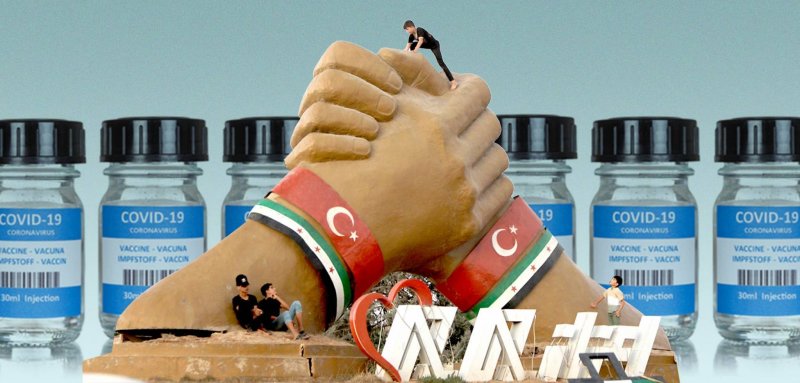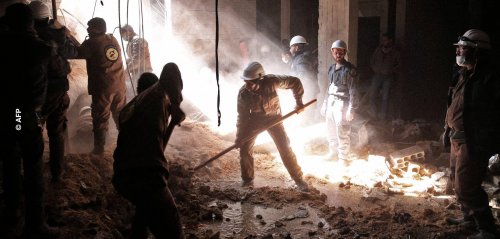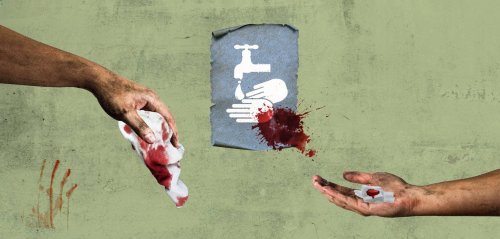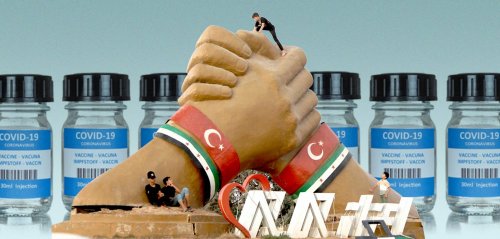So far, COVID-19 vaccines have not reached the areas of northern Syria controlled by military opposition factions mostly subject to Turkish influence. This is a main concern of the residents of this large area, home to about one and a half million people.
Mahmoud (pseudonym) — a doctor working for a year in an isolation and treatment center for corona patients inside the area dubbed the “Euphrates Shield” in the northern countryside of Aleppo — was infected with the virus despite having taken all possible precautions meant for prevention.
Mahmoud holds the Turkish authorities responsible for contracting the virus. He also holds them accountable for the delay in the arrival of vaccines in northern Syria, accusing them of “not caring about securing the vaccine for the medical personnel in the region that are working day and night on the front line of defense in the face of the virus, to this day.”
The doctor says, “I remained in quarantine for 20 days until I recovered, but up until now, two months after getting infected with the virus, I still haven't regained my sense of smell or taste, and I feel that my body is still frail and weak. All this happened to me because the vaccine was not secured by the Turkish government concerned firstly with providing the necessary protection for the medical staff.” He went on to stress that “to this point, vaccines have not been made available to the medical staff or anyone else in the ‘Euphrates Shield’ area, and we are still waiting for their arrival …in vain.”
Mahmoud spoke to Raseef22 on the condition of anonymity. He is afraid for his life and his job, since he lives in an area under the control of armed factions loyal to Turkey… he says: “In the event that my identity is revealed, I will have problems and be subject to investigations that may result in me being imprisoned or dismissal from work.”
The people of northern Syria are left without vaccinations, even though medical teams in Turkey have started taking vaccinations since January 13, 2021.
This has led to a dissatisfaction among the medical staff in the northern regions of Syria regarding the lack of mutual treatment by the Turkish government towards them, as well as its complete absenteeism on the issue of vaccination, despite the fact that this region in particular is subject to its influence. Turkey has appointed a governor and a military commander for each district (Turkish nationals), in addition to imposing compulsory identification cards on the residents of the “Euphrates Shield” and “Olive Branch” regions.
Turkey controls the “Euphrates Shield” area, which includes the cities of A’zaz, Jarabulus, al-Bab and the surrounding countryside — all of which are located in the northern and northeastern countryside of Aleppo. It was able to take control after its forces, in cooperation with armed opposition factions, launched a military operation against ISIS — which had its hold on the region at the time. The military operation began on August 24, 2016 and ended on March 29, 2017.
As for the “Olive Branch” area — which includes the cities of Afrin and Jindires along with their countryside in northwestern Aleppo — Turkish forces, in cooperation with the armed opposition factions loyal to them, was able to take its control from the Syrian Democratic Forces, following a military operation that lasted from January 20 to March 18 during the year of 2018.
Currently, these two areas are subject to the military and administrative authority of Syrian military factions loyal to Turkey, under the supervision of Turkish forces.
The Weakest Link
Mahmoud, the doctor, is among the nearly 22,000 COVID cases in northern Syria that have been recorded since the virus first appeared on July 9, 2020.
The Syrian doctor spoke on the condition of anonymity, fearing for his life and job, since he lives in an area under the control of armed factions loyal to Turkey, “If I’m identified, I’ll have problems that may result in my imprisonment or dismissal from work”
In addition to the dangers facing medical staff — considered the weakest link due to their direct contact with patients — there are real concerns for the lives of the elderly and those with chronic diseases, all of whom concerned parties in the region should be seeking to secure vaccines for.
Mahmoud is not the only one who has concerns about the delay in the arrival of vaccines in northern Syria. Ahmed, a 36-year-old citizen from the Idlib countryside, now resides in the countryside of Azaz within the “Euphrates Shield” region. He also has concerns about its delay as well as the way it would be distributed when it arrives.
He tells Raseef22, “Up until this moment, this vaccine has not been made available for us. The delay in its arrival is not in the interest of the residents of this area and in case it is made available, will it be given according to priority? My mother suffers from diabetes, and I am constantly worried about her contracting the virus because her immunity is weak. When the vaccine arrives, will my mother have priority, or will favoritism and military influence affect its distribution?”
Another doctor from the “Syria Immunization Group” in the “Euphrates Shield” region refused to reveal his name as well due to his fear of the repercussions. For his part, he holds Turkey directly responsible when it comes to securing vaccines.
He tells Raseef22, “The Turkish government is directly responsible for securing the vaccine, because all administrative, health, and military operations are run by Turks.” He adds, “Turkey, which is the one holding influence in the region, is directly concerned and responsible for providing vaccines to the populace, and this responsibility should not be evaded through the use of elastic words such as supervision, cooperation, or coordination.”
“Will the vaccine be given according to priority when it arrives in north Syria? My mother suffers from diabetes and weak immunity, when the vaccine arrives, will she have priority or will favoritism and military influence affect its distribution?”
He also sees that the Ministry of Health in the interim government “has a joint responsibility with the Turkish government in securing the vaccine, as it is part of the National Coalition for Syrian Revolutionary and Opposition Forces based in Istanbul. It only coordinates with the Syria Immunization Group, UNICEF, and the World Health Organization, and does not assume its responsibilities as an official government agency that is directly responsible for securing the vaccine for the residents of these areas.”
The Syria Immunization Group is an independent non-governmental team, and it coordinates its work with the local councils operating within the two regions.
Fear of a Vaccine That Has Not Yet Arrived
The British AstraZeneca vaccine was supposed to reach the “Euphrates Shield” and “Olive Branch” regions with the help of the Syria Immunization Group, and in cooperation with the World Health Organization and UNICEF. It was also meant to cover the vaccination of 20% of the local population within the first phase — namely the medical staff, the elderly and those with chronic diseases, according to Dr. Mohammad Saleh, Director of the Early Warning Alert and Response System—EWARN (also referred to as Syria's early warning disease surveillance system) in the “Euphrates Shield”.
Saleh tells Raseef22, “The vaccine was supposed to arrive during the second half of March, but because of what was circulated in some medical spaces and in the international media about the vaccine causing clots that lead to death, it’s been halted for the time being. The Syria Immunization Group decided not to rush in adopting it, so as not to negatively affect the vaccination process as a whole.”
“Turkey is the one holding influence in the region and is directly concerned and responsible for providing vaccines to the residents of the region, and this responsibility should not be evaded through the use of elastic words such as supervision, cooperation, or coordination”
In the regions of “Euphrates Shield” and “Olive Branch”, there are six isolation centers in Marea, A’zaz, al-Bab, Jarabulus and Afrin. In the recent period, each center records between just two and four cases of corona per day, but some attribute this to the low number of tests (PCRs) being administered.
All that is published daily on social media regarding the side effects of vaccines negatively affects the residents’ opinion in vaccination — so much so, that some of them are still not actually convinced of the existence of the Coronavirus and the necessity of vaccination. All this forces medical staff to make greater efforts in order to raise health awareness.
Abdul Rahman, a 60-year-old from the countryside of Afrin, is one of these people. He tells Raseef22, “The vaccine has not been made available in the region until this moment, and I don’t know why. This virus called Corona is a lie made by the big rich countries so they could manufacture medicine and sell it to poor countries. I saw many videos about the genetic change that affects people that get vaccinated, and I heard about the vaccine causing clots that lead to death. I do not need these things in my life and refuse to take it.”
Until the first batch of the AstraZeneca vaccine arrives in northern Syria, this region will remain without a vaccine until further notice, in light of the complete indifference of the de facto authorities and government bodies affiliated with the opposition regarding the health of hundreds of thousands of citizens.
Raseef22 is a not for profit entity. Our focus is on quality journalism. Every contribution to the NasRaseef membership goes directly towards journalism production. We stand independent, not accepting corporate sponsorships, sponsored content or political funding.
Support our mission to keep Raseef22 available to all readers by clicking here!
Interested in writing with us? Check our pitch process here!









